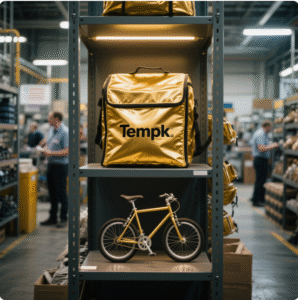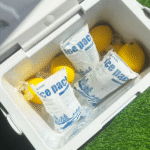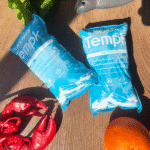Imagine um ciclista de entrega que navega por becos estreitos em Paris ou se esquivando das monções em Mumbai, encarregado de transportar sushi fresco, vacinas que salvam vidas, ou sorvete artesanal. Nestes cenários de alta pressão, mesmo pequenas flutuações de temperatura ou choques na estrada podem comprometer a qualidade do produto. Delivery bags for bikes estão emergindo como mudança de jogo, transformando bicicletas em ágeis, veículos ecológicos da cadeia de frio. Combinando design robusto com tecnologia inteligente, essas sacolas garantem que os produtos perecíveis cheguem intactos, ao mesmo tempo em que apoiam as metas de emissão zero das cidades – uma mudança crítica à medida que a demanda por entrega urbana aumenta 24% anualmente.

O Desafio da Cadeia de Frio Urbana: Velocidade versus. Estabilidade
Bicycles dominate last-mile logistics in congested cities, mas os coolers tradicionais montados em bicicletas lutam com:
-
Instabilidade da temperatura: 68% de ciclistas relatam alimentos que chegam mais quentes do que o pretendido devido ao isolamento inadequado3.
-
Dano de vibração: Estradas irregulares estragam itens frágeis, como amostras de laboratório ou produtos embalados em vidro.
-
Lacunas de sustentabilidade: Plásticos descartáveis e isopor colidem com os valores do consumidor ecologicamente consciente.
As bolsas térmicas compatíveis com bicicletas da Tempk enfrentam esses problemas de frente, mesclando engenharia de precisão com gestão ambiental.
Tempk CycleTherm Pro Series: Mais inteligente, Entregas mais ecológicas
Projetado para ciclistas urbanos, Tempk’s thermal delivery bags prioritize durability, inteligência, e sustentabilidade:
1. Vibration-Resistant Insulation
-
Painéis aprimorados com aerogel: Inspired by aerospace technology, these materials reduce heat transfer by 45% comparado à espuma padrão, Mantendo as temperaturas entre -10 ° C e 50 ° C para 12+ horas2.
-
Compartimentos de absorção de choque: Multi-layer padding minimizes road vibrations, reducing breakage by 90% in trials with pharmaceuticals.
2. Weatherproof Durability
-
Escudo impermeável IP67: Suporta chuva forte e umidade, crítico para climas tropicais.
-
Exterior reflexivo UV: Reduz a absorção de calor solar em 30%, preventing internal temperature spikes during summer rides.
3. Transparência orientada para IoT
-
Rastreamento em tempo real: Sensores incorporados monitoram a temperatura, umidade, e localização GPS, syncing data to a handlebar-mounted app. Alerts notify riders of deviations beyond FDA/WHO thresholds.
-
QR Code Traceability: Customers scan codes to view their delivery’s journey—boosting trust and satisfaction.
4. Projeto de Economia Circular
-
Materiais: Construído a partir de 100% plásticos oceânicos reciclados e revestimentos biodegradáveis, cada saco reaproveita 2 kg of marine waste.
-
Modular Components: Interchangeable parts extend lifespan by 300%, while Tempk’s buyback program converts retired bags into raw materials for new products.
Why Cities and Businesses Are Embracing Bike-Based Cold Chains
-
Economia de custos: Reusable Tempk bags save $600+ annually per rider compared to disposable options.
-
Conformidade Regulatória: Meets EU’s 2025 Urban Delivery Standards for zero-emission transport and recyclable packaging.
-
Lealdade à marca: 78% of consumers prefer eco-friendly deliveries, with Instagrammable designs generating 3x more social media engagement.
O futuro: Cadeias de frio sobre duas rodas
As cities expand bike lanes and restrict fossil-fuel vehicles, As soluções de Tempk capacitam as empresas para:
-
Tempos de entrega de corte: Os ciclistas ignoram o tráfego, alcançando 25% Drop-offs mais rápidas que vans.
-
Escala de forma sustentável: Solar-ready designs charge IoT devices, Cortando o desperdício de bateria por 70%.
-
Combat Climate Impact: Cada saco compensa 15 kg de CO2 anualmente através de escolhas de materiais.
Conclusão
Delivery bags for bikes are no longer niche tools but essential allies in building resilient, eco-friendly urban cold chains. Tempk’s CycleTherm Pro Series exemplifies this evolution, offering a blend of rugged performance, tecnologia inteligente, and planet-first design. Para empresas que enfrentam o desafio da última milha, adopting such innovations isn’t just about efficiency—it’s about pedaling toward a fresher, futuro mais verde.























